

How common are mental health problems? Caution on these figures The 2014 survey that many of these figures come from only looked at people who were: aged 16 and overliving in private housingliving in England (data wasn’t collected in Wales).
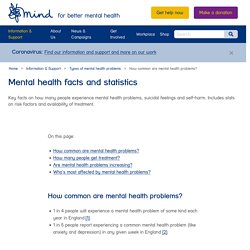
This excludes lots of groups of people. For example, these figures do not include people who are: Tags - UK Health Public Health Network. Tips for coping with depression. Try these coping strategies if you're feeling depressed.
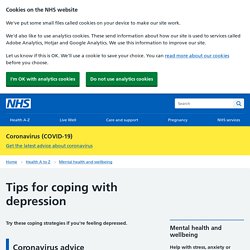
Stay in touch Don't withdraw from life. Socialising can improve your mood. Keeping in touch with friends and family means you have someone to talk to when you feel low. Be more active Take up some form of exercise. Read about exercise for depression. Face your fears Don't avoid the things you find difficult. If this starts to happen, facing up to these situations will help them become easier. Reading Ten ways to fight your fears may help. Don't drink too much alcohol For some people, alcohol can become a problem. Read some tips on cutting down on alcohol. Try to eat a healthy diet Some people don't feel like eating when they're depressed and are at risk of becoming underweight. Antidepressants can also affect your appetite.
If you're concerned about weight loss, weight gain or how antidepressants are affecting your appetite, talk to your GP. See tips on how to eat more healthily. Movember - Home. Suicide facts and figures. Suicide statistics and trends for the UK and Republic of Ireland.
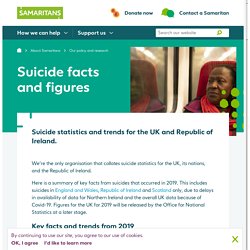
We’re the only organisation that collates suicide statistics for the UK, its nations, and the Republic of Ireland. Here is a summary of key facts from suicides that occurred in 2019. This includes suicides in England and Wales, Republic of Ireland and Scotland only, due to delays in availability of data for Northern Ireland and the overall UK data because of Covid-19. Figures for the UK for 2019 will be released by the Office for National Statistics at a later stage.
SamaritansSuicideStatsReport 2019 Full report. SamaritansSuicideStatsReport 2019 Full report. 9 Depression Symptoms to Look Out For. Could it be depression?
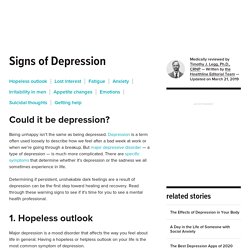
Being unhappy isn’t the same as being depressed. Depression is a term often used loosely to describe how we feel after a bad week at work or when we’re going through a breakup. But major depressive disorder — a type of depression — is much more complicated. There are specific symptoms that determine whether it’s depression or the sadness we all sometimes experience in life. Determining if persistent, unshakable dark feelings are a result of depression can be the first step toward healing and recovery. Major depression is a mood disorder that affects the way you feel about life in general. Other feelings may be worthlessness, self-hate, or inappropriate guilt. Depression can take the pleasure or enjoyment out of the things you love. Another area where you may lose interest is sex. Part of the reason you might stop doing things you enjoy is because you feel very tired. Depression is also linked with insomnia, as one might lead to the other and vice versa. What Are the 5 Signs of Mental Illness?
Mental illness is common, and one in every five people may be affected.
A sign is a change in ones eating habits – ellieanne
Mental illness or mental health disorders are a wide range of conditions affecting mental health.
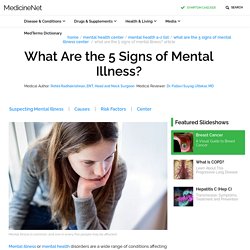
Mental disorders affect mood, thinking, and behavior of individuals. Some common mental disorders include anxiety, depression, addiction, eating disorders (anorexia and bulimia), and schizophrenia. Many mental disorders can significantly interfere with the ability to function normally, work, study, or maintain quality of life, affecting the quality of life. 4 Foods that Might Make Depression Worse. Foods to Avoid If You Have Anxiety or Depression. Middle-Age Women Have Highest Rate of Depression.
One in eight middle-age women in the United States has depression, a new report finds.

This means that women ages 40 to 59 have the highest rate of depression (12.3 percent) of any group based on age and gender in the U.S., according to the report from the Centers for Disease Control and Prevention. In all other age groups as well, women had higher rates of depression than men did. Among Americans ages 12 and older, 9.5 percent of females and 5.6 percent of males had moderate or severe depression during the previous two-week period, according to the report, which is based on data gathered from 2009 through 2012. Depression is a serious medical condition that can affect not only people's mood, but also their cognitive functions, such as concentration and decision-making abilities, and even their physical well-being. Teen depression. Overview Teen depression is a serious mental health problem that causes a persistent feeling of sadness and loss of interest in activities.
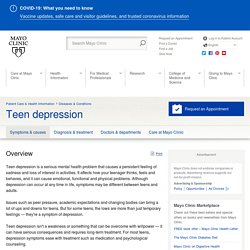
It affects how your teenager thinks, feels and behaves, and it can cause emotional, functional and physical problems. Although depression can occur at any time in life, symptoms may be different between teens and adults. Issues such as peer pressure, academic expectations and changing bodies can bring a lot of ups and downs for teens. But for some teens, the lows are more than just temporary feelings — they're a symptom of depression. Teen depression isn't a weakness or something that can be overcome with willpower — it can have serious consequences and requires long-term treatment. Symptoms. What causes depression? Onset of depression more complex than a brain chemical imbalance It's often said that depression results from a chemical imbalance, but that figure of speech doesn't capture how complex the disease is.
Research suggests that depression doesn't spring from simply having too much or too little of certain brain chemicals. Rather, there are many possible causes of depression, including faulty mood regulation by the brain, genetic vulnerability, stressful life events, medications, and medical problems.